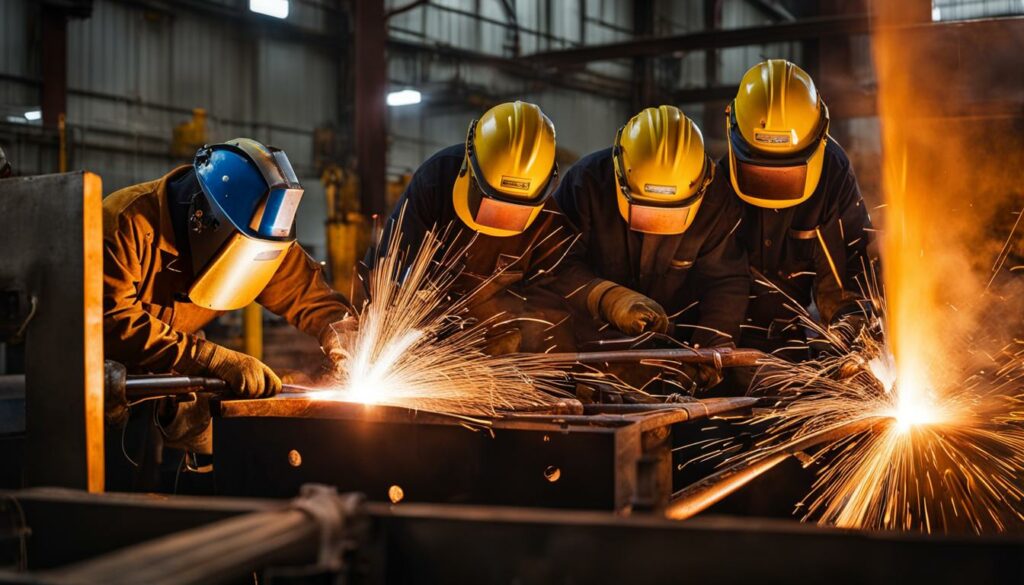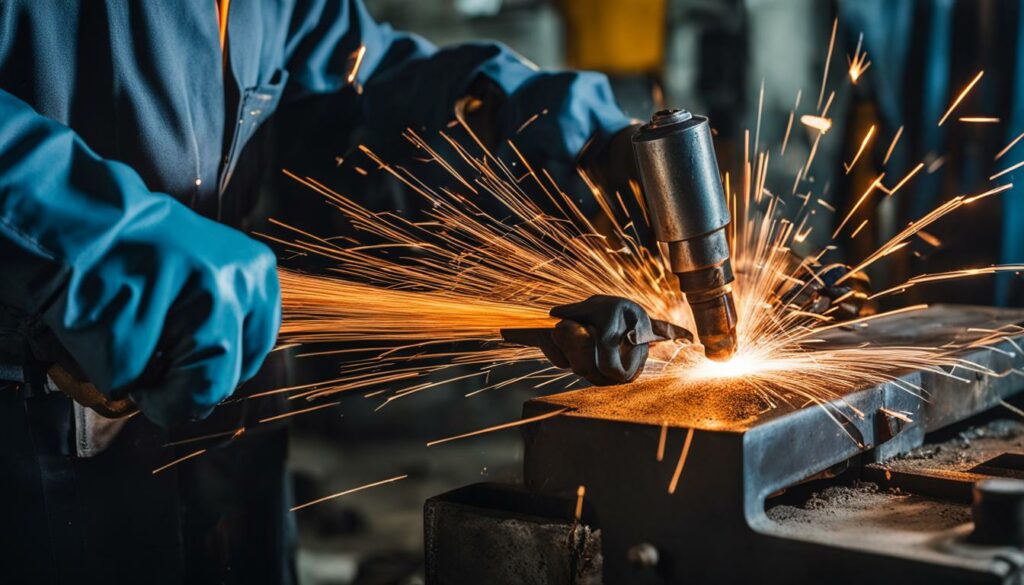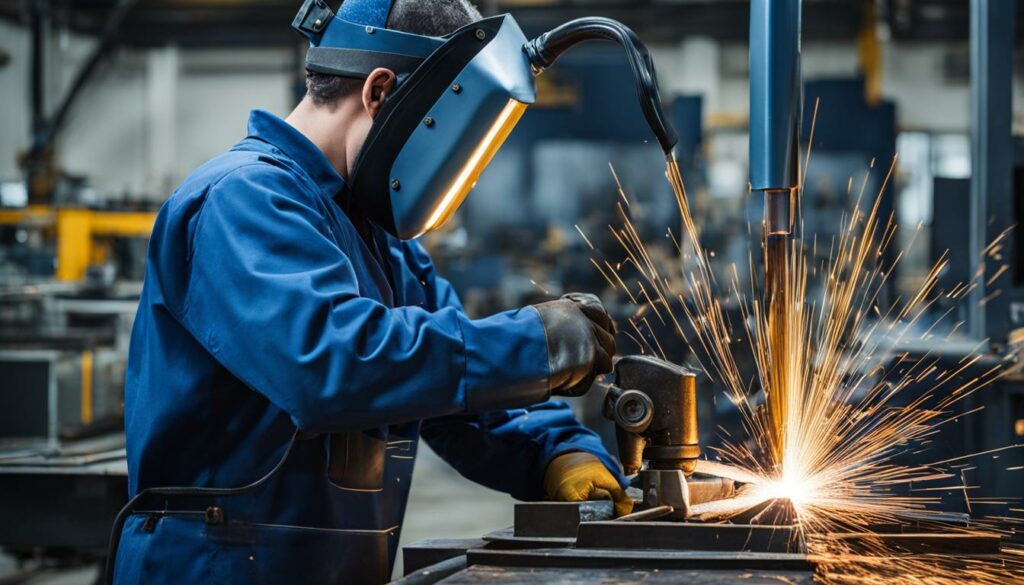When it comes to welding maintenance for your industrial equipment, you need reliable and top-rated services that deliver exceptional results. Industrial welding plays a crucial role in various industries, ensuring the strength and durability of metal components and structures. Whether you require welding repairs, custom fabrication, or general industrial maintenance services, finding the right provider is essential for the longevity and efficiency of your equipment.
Key Takeaways:
- Industrial welding maintenance services are vital for the longevity and efficiency of industrial equipment and components.
- Top-rated welding service providers offer a wide range of solutions, including welding repairs and custom fabrication.
- Industrial welding involves various methods such as fusion welding, pressure welding, and brazing.
- Quality control is crucial in industrial welding to ensure durable and reliable welds.
- Industrial welding services cater to various industries such as the medical industry, oil and gas industry, mold revision and repair, and gun components.
Understanding Different Types of Welding Methods
When it comes to industrial welding, there are various methods that professionals use to join metal parts together. Understanding these different welding methods is essential for choosing the right approach for your specific project. Let’s take a closer look at the four commonly used methods: arc welding, spot welding, laser welding, and brazing.
Arc Welding
Arc welding is one of the most widely used methods in the industry. It involves creating an electric arc between an electrode and the base metal, which generates intense heat. This heat melts the metal and creates a weld pool, which solidifies to form a strong joint. Different types of arc welding techniques include covered arc welding, semi-automatic arc welding, and TIG (Tungsten Inert Gas) welding.
Spot Welding
Spot welding is commonly used for joining thin metal sheets together. It involves using two copper electrodes to pass an electric current through the metal, causing resistance heating to occur. The metal becomes molten and fuses together, creating a spot weld. This method is often used in industries such as automotive manufacturing, where it is used to join body panels and other components.
Laser Welding
Laser welding utilizes a high-energy-density laser beam as a heat source. The laser beam is focused on the area to be welded, causing the metal to melt and form a strong bond. This method offers precise control and can be used for both small and large-scale welding projects. Laser welding is commonly used in industries that require high accuracy, such as aerospace and medical equipment manufacturing.
Brazing
Brazing involves joining metals using a solder with a lower melting point than the metal being joined. The solder is heated, allowing it to flow and create a bond between the metals. Brazing is often used for joining dissimilar materials, such as copper and stainless steel. It provides strong, leak-proof joints and is commonly used in HVAC systems, automotive manufacturing, and plumbing applications.
| Welding Method | Common Applications |
|---|---|
| Arc Welding | Automotive, construction, metal fabrication |
| Spot Welding | Automotive, appliance manufacturing |
| Laser Welding | Aerospace, medical equipment manufacturing |
| Brazing | HVAC, automotive, plumbing |
Each welding method has its own advantages and is suitable for different applications. By understanding the differences between arc welding, spot welding, laser welding, and brazing, you can make informed decisions when it comes to your industrial welding projects.
Benefits of Industrial Welding Services
Industrial welding services offer a wide range of benefits for various industries. Whether it’s for repairing and maintaining equipment or creating custom fabrication solutions, industrial welding plays a crucial role in ensuring the longevity and efficiency of industrial operations. Here are some key advantages of utilizing industrial welding services:
Cost Savings
Industrial welding services can help businesses save money in the long run. By repairing and maintaining equipment rather than replacing it, companies can avoid the high costs associated with purchasing new machinery. Additionally, regular welding maintenance can prevent costly breakdowns and extend the lifespan of equipment, resulting in significant savings over time.
Improved Product Quality
Industrial welding services contribute to improved product quality by ensuring the integrity and strength of welds. Skilled welding technicians can produce high-quality welds that meet industry standards and specifications. This level of precision and craftsmanship directly translates into superior product performance and reliability.
Increased Efficiency
Efficiency is essential in industrial settings, and industrial welding services can help streamline operations. By promptly repairing equipment and ensuring optimal functionality, welding services minimize downtime and maximize productivity. This allows businesses to meet production deadlines, fulfill customer orders, and maintain a competitive edge in the market.
Overall, industrial welding services provide cost savings, improved product quality, and increased efficiency for a wide range of industrial applications. Whether it’s repairing machinery, creating custom fabrication solutions, or maintaining equipment, utilizing professional welding services is crucial for achieving reliable and durable results.

Quality Control in Industrial Welding
Quality control plays a vital role in ensuring the durability and reliability of industrial welding projects. By implementing stringent quality control processes, welding companies can ensure that their welds meet the highest standards of strength and functionality. Quality control measures are particularly important in welding repairs and critical welding projects, where even the smallest flaws can have serious consequences.
To maintain high-quality standards, industrial welding companies rely on qualified welding technicians who hold the necessary welding certifications. These certifications serve as proof of their expertise and knowledge in the field of welding. Welding technicians with certifications are equipped with the skills to perform quality inspections, identify potential defects, and make necessary adjustments to ensure the integrity of the welds.
Welding quality control also involves thorough inspections of welding equipment and materials used in the welding process. Regular maintenance and calibration of equipment are essential to ensure accurate results. Additionally, welding companies must adhere to industry standards and protocols to guarantee the quality and consistency of their welds.
Benefits of Quality Control in Industrial Welding:
- Ensures durable and reliable welds
- Reduces the risk of structural failures
- Improves overall product quality
- Increases customer satisfaction
- Enhances safety in welding projects
By prioritizing quality control in industrial welding, companies can deliver high-quality welds that meet industry standards and exceed customer expectations.

Industries Served by Industrial Welding Services
Industrial welding services play a vital role in various industries, catering to their specific needs for robust and reliable welding solutions. Let’s explore some of the key industries that heavily rely on industrial welding services:
1. Medical Industry
The medical industry demands precise and high-quality welding for the production of medical devices. Industrial welding services ensure the integrity of these devices, guaranteeing the safety and well-being of patients. From surgical instruments to implantable devices, welding plays a critical role in medical manufacturing.
2. Oil and Gas Industry
The oil and gas industry relies on industrial welding services for equipment maintenance, repair, and fabrication. Welding is essential for pipelines, storage tanks, and offshore platforms. The integrity of these welding projects is crucial to ensure the safety and efficiency of oil and gas operations.
3. Mold Revision and Repair
In the manufacturing sector, industrial welding services are often utilized for mold revision and repair. Precision welding techniques are employed to address any damages or defects in molds, maintaining high-quality production standards. Welding plays a crucial role in extending the lifespan of molds, minimizing production downtime, and ensuring consistent product quality.
4. Gun Components
Industrial welding services are also involved in the fabrication and repair of gun components. Welding processes are employed to ensure the precise and reliable joining of various firearm parts, contributing to the safety and accuracy of the weapons. The firearm industry heavily relies on welding expertise to meet stringent quality and durability standards.
These are just a few examples of the industries that benefit from industrial welding services. The diverse applications of welding highlight its significance in various sectors, supporting the maintenance, repair, and fabrication needs of critical equipment and components.
Conclusion
Industrial Welding Maintenance Services play a critical role in ensuring the longevity and efficiency of your equipment and components. With a wide range of applications, these services provide welding solutions tailored to your specific needs. From welding repairs to custom fabrication, finding the right welding service provider is essential.
Regular maintenance of your welding equipment is crucial to prevent costly breakdowns and maximize productivity. By partnering with reputable welding service providers, you can ensure that your equipment is properly maintained and serviced, minimizing downtime and optimizing performance.
When it comes to welding solutions, quality and reliability are paramount. That’s why choosing a trusted welding service provider is key. Look for service providers with a proven track record, qualified technicians, and industry certifications. This will give you peace of mind knowing that your welding projects are in capable hands.
So, whether you are in need of welding repairs, custom fabrication, or precision welding, rely on Industrial Welding Maintenance Services to meet your industrial needs. Contact us at (623) 263-0277 to discover the top-rated welding service providers in the USA and ensure that your operations run smoothly and efficiently.
FAQ
What are industrial welding services?
Industrial welding services involve joining two or more metal parts using pressure, heat, or both. These services have a wide range of applications in various industries.
What are the different types of welding methods?
The four commonly used welding methods are arc welding, spot welding, laser welding, and brazing.
What are the benefits of industrial welding services?
Industrial welding services offer cost savings, improved product quality, and increased efficiency. They are essential for industries such as automotive, oil and gas, defense, and industrial manufacturing.
Why is quality control important in industrial welding?
Quality control is crucial in industrial welding to ensure durable and reliable welds. Industrial welding companies should have stringent quality control processes in place to guarantee the strength and functionality of their welds.
Which industries are served by industrial welding services?
Industrial welding services cater to various industries, including the medical industry, oil and gas industry, mold revision and repair, and gun components.
How do I choose the right industrial welding service provider?
Finding a reputable industrial welding service provider is key to meeting your industrial needs. Consider factors such as experience, certifications, and customer reviews when making your decision.

